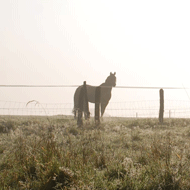
MPs debate an extension of powers to remove fly-grazed horses
Landowners may be given more power to remove horses left to graze illegally on their land, under a new bill being debated by MPs this afternoon.
If successful, the Control of Horses Bill will give private landowners the same powers already proposed for councils, to help tackle the problem of illegal fly-grazing.
Promoted by Julian Sturdy MP, the bill will allow faster removal of horses left to graze on private land without permission and will reduce the period of time before landowners can take action from 14 days to four.
Previously, those detaining fly-grazing horses could only sell them at auction or market. Under new proposals, landowners will have the option to rehome them, give them to a charity or have them euthanised if necessary on welfare grounds.
A report released in August last year estimated there were at least 3,000 horses fly-grazing in England alone.
Henry Robinson, president of the Country Land and Business Association, said: "Horses can suffer significant harm if they are left to fend for themselves so it is vital that landowners have the power to act quickly and in the best interest of the welfare of these animals.
"We are delighted the Government supports our call for the powers in the Bill to be extended to private landowners and not just limited to local authorities."
View the 2014 report on fly-grazing: www.cla.org.uk/



 The Federation of Independent Veterinary Practices (FIVP) has announced a third season of its podcast, Practice Matters.
The Federation of Independent Veterinary Practices (FIVP) has announced a third season of its podcast, Practice Matters.